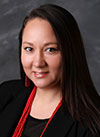I am a Little Shell Chippewa tribal member and a direct descendant of Menominee and Stockbridge-Munsee Mohican Nations. My children and husband are enrolled Mohican tribal members. Do we “celebrate” Thanksgiving?
We prepare the traditional fixings and eat turkey, cranberry relish, stuffing, squash, mashed potatoes, wild rice, and pies. But one thing I’ve never experienced at these family gatherings is a moment to reflect on Thanksgiving as a celebration between the pilgrims and Native Peoples at Plymouth Rock.
Although this feast might have occurred, consider what happened later.
After the feast, our shared American history chronicles broken treaties, extermination, removal from homelands, assimilation, termination, self-determination, and reaffirmation of tribal sovereignty through federal policy and law. These policies aren’t relics of my ancestral past; they continue to affect me and my family.
You see, after the feast:
My grandfather Menominee Chief Iometah survived every broken treaty he signed.
My grandfather Mohican Sachem Konkapot survived nine removals from homelands despite his military service to the United States.
My grandmother Mohican tribal member Lida May Konkapot Gardner survived assimilation assaults as an 11 year old at Carlisle Indian Boarding School, where the motto was “Kill the Indian, to Save the Man.”
My Menominee grandparents survived termination of the Menominee Tribe in 1954 and the Menominee Restoration Act in 1973.
My cousin Rae Elaine Tourtillott was murdered and is among the many missing and murdered Indigenous people whose murder has never been solved (https://tinyurl.com/393a5z5z).
The Little Shell Chippewa Tribe survived hundreds of years of denial of their existence as punishment for walking away from the Ten-Cent Treaty until their federal recognition in 2019.
Celebrating the feast without considering what occurred
after the feast perpetuates a false reality and denies the truth, healing, and growth we need.
Yet, my family’s legacy is resiliency. I am here because of my ancestors’ sacrifices, strength, hope, knowledge, and determination. I honor this legacy by being mindful of how my actions affect future generations.
Please consider what you can do after the feast: acknowledge the Native People’s lands you live and work on; learn about the 12 tribes in Wisconsin; support efforts to protect and preserve Native lands and sacred places; reduce the high incarceration rate of Native People in Wisconsin; become an ally to Missing & Murdered Indigenous Women (MMIW) and LGTBQ+ people.
Please join me at the table to plan a brighter future together after the feast.
Resources for More Information
Native Chefs Thanksgiving Recipes,
https://www.smithsonianmag.com/blogs/national-museum-american-indian/2020/11/23/native-chefs-thanksgiving-recipes/
The Invention of Thanksgiving,
https://insider.si.edu/2018/01/the-invention-of-thanksgiving/
- Federal Indian Law and Policy Resources:
Native Land Map,
https://wisconsinfirstnations.org/native-land-map/
Wisconsin First Nations: American Indian Studies in Wisconsin,
https://wisconsinfirstnations.org/
Native Lands and Sacred Places,
https://narf.org/category/tribal-lands/
American Indians Incarcerated at Among Highest Rates in Wisconsin,
https://www.greenbaypressgazette.com/story/news/native-american-issues/2021/03/17/native-americans-incarcerated-among-highest-rates-wisconsin/6841084002/
Wisconsin Department of Justice, Missing and Murdered Indigenous Women Task Force,
https://tinyurl.com/53nhj9u5
Wisconsin Judicare Indian Law Office,
http://www.judicare.org/content.cfm?PageID=33
Wisconsin Public Defender Jobs,
https://wisc.jobs/Pages/Agency/OPD.aspx?unit=55000
State Bar of Wisconsin Pro Bono Program,
https://www.wisbar.org/formembers/probono/pages/pro-bono.aspx
Meet Our Contributors
What do you enjoy most about working at The Wilderness Society?
 Recently, the U.S. Department of Interior made an announcement to change the names of hundreds of rivers, mountains, and canyons from an offensive slur against Native American women to names that reflect the local character of each place. Nearly 650 geographic features from California to Connecticut were changed. As a Native American woman with a daughter and nieces, I am filled with hope for current and future generations. I see this as a historic first step toward intergenerational healing while making public lands more inclusive and welcoming for all people.
Recently, the U.S. Department of Interior made an announcement to change the names of hundreds of rivers, mountains, and canyons from an offensive slur against Native American women to names that reflect the local character of each place. Nearly 650 geographic features from California to Connecticut were changed. As a Native American woman with a daughter and nieces, I am filled with hope for current and future generations. I see this as a historic first step toward intergenerational healing while making public lands more inclusive and welcoming for all people.
Starlyn Rose Tourtillott Miller, Native Lands Partnerships Director,
The Wilderness Society, Washington, D.C.
Become a contributor! Are you working on an interesting case? Have a practice tip to share? There are several ways to contribute to
Wisconsin Lawyer. To discuss a topic idea, contact Managing Editor Karlé Lester at
klester@wisbar.org. Check out our
writing and submission guidelines.
» Cite this article:
95 Wis. Law. 72 (November 2022).
